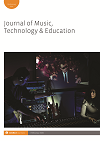- Home
- A-Z Publications
- Journal of Music, Technology & Education
- Previous Issues
- Volume 1, Issue 2, 2008
Journal of Music, Technology & Education - Volume 1, Issue 2-3, 2008
Volume 1, Issue 2-3, 2008
-
-
The medium is the message: cyberspace, community, and music learning in the Irish traditional music virtual community
More LessAuthors: Janice L Waldron and Kari K VeblenThis article examines the music teaching and learning in the Irish traditional virtual music community or IrTrad in cyberspace, noting the multiple, fluid and overlapping ways in which the IrTrad community defines itself. For example, YouTube videos give rise to heated discussions in other platforms on all aspects of the videos: quality, performance practices, issues of authenticity, usefulness in learning, repertoire and other areas related to learning the music and the instrument. We frame this discussion with inspiration from Marshall McLuhan's notions about hot and cold media, applying them to survey Internet learning.
-
-
-
Adapting to change: working with digital sound using open source software in a teaching and learning environment
More LessAuthors: Adrian Moore and Dave MooreThis article contributes towards knowledge and understanding of the creative use of software and hardware tools for computer music. It stems from a need to reassess strategic spending within an academic department on music IT, and an interest in the advantages of open source software for managing musical and collaborative projects. The authors discuss the most practical way of assessing the use of Linux, a completely open source software platform with the aim of understanding how compositional paradigms migrate between computer operating systems, noting similarities between systems, and highlighting strengths and weaknesses of the process.It is apparent that the Linux platform has much to offer, but remains limited in a number of areas of music IT that are used extensively in academia, industry and at home. However, as a platform for teaching and learning computer music it is an ideal tool, though we conclude that some introduction at the outset is required for those who are uninitiated to a Linux-based system. The teaching and learning initiative expected students, by the end of a three-year undergraduate degree programme, to be creating their own tools and to have a good understanding of related operating systems.
-
-
-
Social media as an opportunity for pedagogical change in music education
More LessMany higher education institutions have been utilizing learning management systems in their teaching. These systems and the ways they are used, however, usually implement a traditional instructivist approach to teaching. Social networking platforms (SNPs) and online communities are an integral part of most music students' everyday lives. SNPs are used for creating connections, but also for sharing one's music, providing information as well as for learning. They can also introduce a student-centred approach to learning by offering ownership of the environment to its core users, and by creating a need to communicate and contribute to a community of practice.
-
-
-
Music two-point-zero: music, technology and digital independence
More LessBy Paul DraperInternet technologies have enabled a participatory culture which is transforming value systems and opening new pathways for autonomous creativity and innovation. In this web 2.0 phenomenon, social networks continue to define the information society and, in turn, redefine music career opportunities quite differently from traditional preconceptions. In parallel, higher education ideology is consumed by a preoccupation with branding, where universities control websites as information delivery tools, while classroom timetables and e-learning systems systematize pedagogical models which limit students' professional potential. This paper examines this disconnect and frames a praxis intervention project to address the need for dynamic ontologies that can be maintained in a training environment reminiscent of social networking. The project details the outcomes of a longitudinal action research project and makes the case for music 2.0 education, that is, for independent musical craft and technological expertise set in authentic learning contexts.
-
-
-
Delivering student feedback in higher education: the role of podcasting
More LessBy Steve CooperStudent numbers across the higher education sector have risen over recent years and the challenge of creating and delivering an effective learning experience grows evermore complex for the educator. It is necessary to provide prompt feedback to students on their current progress and personal areas for development, which is paramount for improving the quality of their future assessed work and also impacts significantly on individual motivation. Podcasting offers a timely and expedient delivery method for a wide range of teaching resources especially when combined with iconic and ubiquitous mp3 devices such as Apple's iPod. The culture of learning and its integration into students' daily lives is changing, and higher education institutions in the United States and Europe have been quick to embrace the potential of this technology, although much of the current research focus is on the delivery and reinforcement of curriculum material. This paper reports on a qualitative study within a music department, using semi-structured interviews and questionnaires to evaluate whether student feedback can also be delivered using audio-based podcasts, and whether this has a significant impact on how students respond to and use the information received. The findings conclude that delivering audio feedback produces a high-quality, personalized and appropriately detailed tutor response that students feel has significantly greater value for learning than more traditional written comments.
-
-
-
Reviews
More LessAuthors: Andrew King, Rowan Oliver, Jonathan Savage and Howard WildeMusic Education with Digital Technology, John Finney and Pamela Burnard (eds) (2007), pp. 223. London: Continuum, pp. 223, ISBN 978-0-8264-9414-5, hardback, 80Sonic Synergies: Music, Technology, Community, Identity, Gerry Bloustien, Margaret Peters and Susan Luckman (eds), 2008 Aldershot: Ashgate, 236 pp. ISBN 978-0-7546-5721-7, hardback, 55.00Music, Informal Learning and the School: A New Classroom Pedagogy, Lucy Green, (2008) Aldershot: Ashgate, 213 pp., ISBN 978-0-7546-6242-6 (hbk), 40.00; ISBN 978-0-7546-6522-9 (pbk), 16.99Pop Idols and Pirates: Mechanisms of Consumption and the Global Circulation of Popular Music, (Ashgate Popular and Folk Music Series), Charles Fairchild, 2008 Aldershot: Ashgate, 182 pp., ISBN 978-0-7546-6383-6, Hardback, 45.00
-
Most Read This Month


